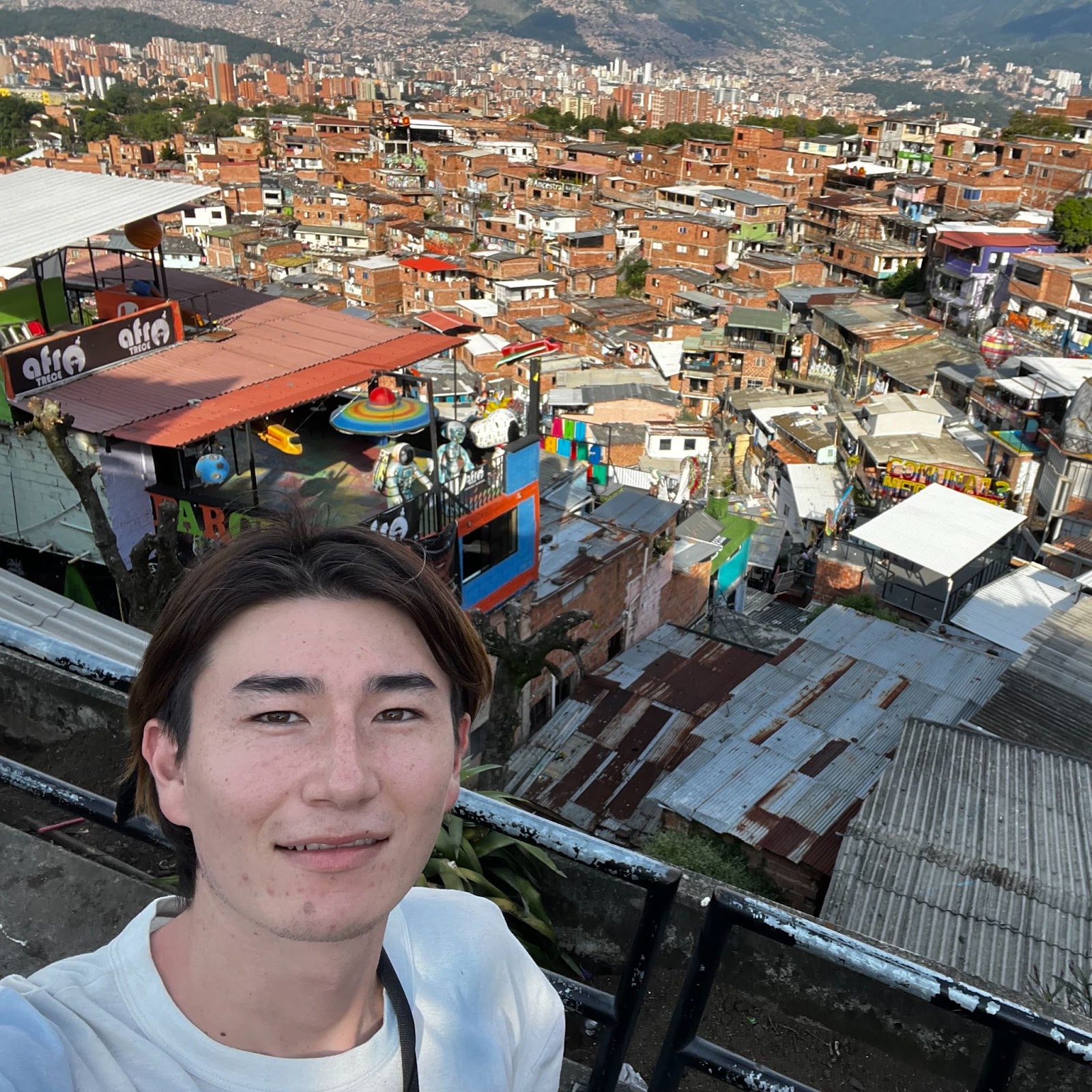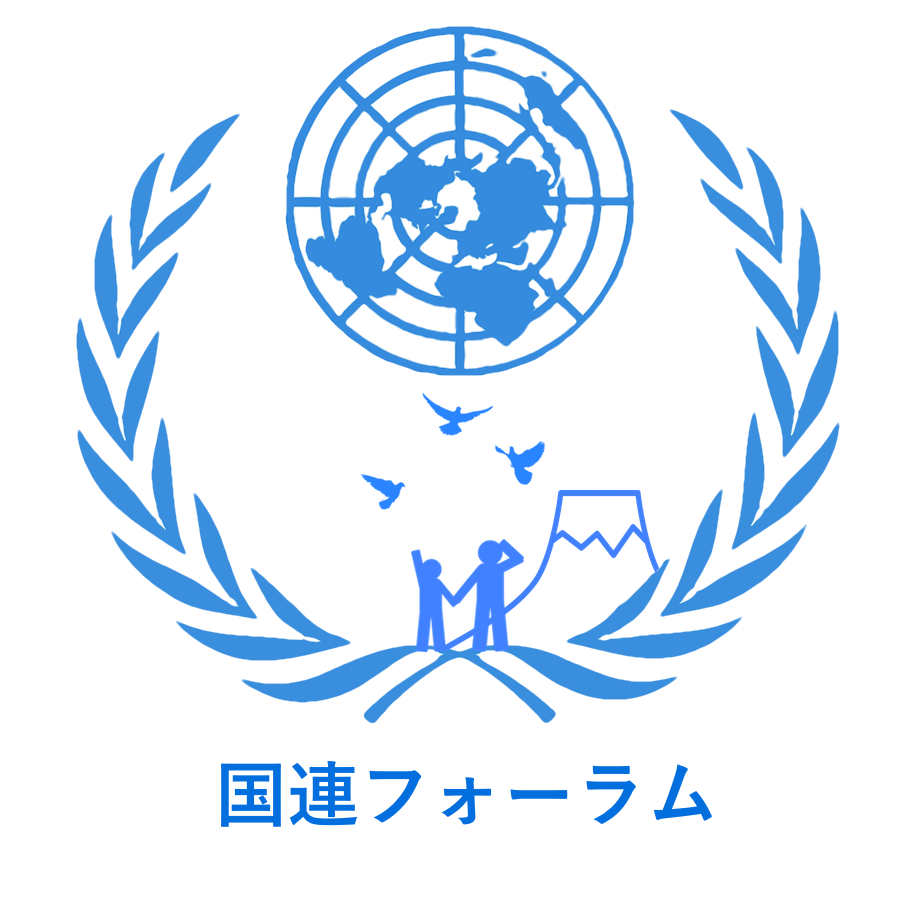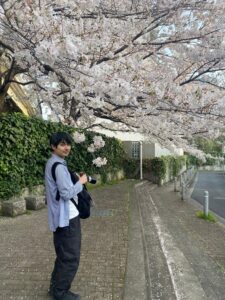コロンビア・スタディ・プログラム - 報告書「Executive Summary (English)」
Summary
This document is an English version of an activity report for the 2024 Colombia Study Program (ColSP), part of the annual Kokuren Forum Study Program, which aims to enhance participants' understanding of global issues and the dynamics of the United Nations. Focusing on Colombia's efforts for peace and sustainable development, the program incorporates preparatory activities, field visits, and post-trip reflections to provide participants with a holistic learning experience. Emphasis is placed on understanding the connections between peacebuilding as well as environmental sustainability, addressing Colombia’s unique challenges and opportunities.
Introduction
1. What is the Kokuren Forum?
The United Nations Forum (referred to as the "Kokuren Forum" in Japanese) is a network of individuals interested in the work of the United Nations and global issues. Since its establishment in 2004, the network has expanded to approximately 9,000 email list subscribers, providing opportunities for discussion on various global topics.
Kokuren Forum serves as a key knowledge hub in Japan for;
- enhancing the understanding of a diverse range of global issues that interact towards sustainable development, and
- promoting the work of the UN systems by disseminating snapshots of ongoing activities and achievements in various thematic areas and regions where the UN systems operate.
Study sessions or networking forums are conducted virtually, as well as in New York, Tokyo, and other locations. The Kokuren Forum website offers information such as opinions/interviews and is widely visited by both its members and the general public. A Steering Committee composed of 30 people plan and implement Forum activities. The Forum is managed voluntarily by its members.
For more information, please visit our website: www.unforum.org (Japanese)
2. What is the Kokuren Forum Study Program?
One of the flagship activities of the Kokuren Forum has been its annual Study Programs, which provide opportunities for its participants to visit regions where international actors, both humanitarian and development, work to improve the lives of the people. These programs include week-long travel to these countries and interactions with various stakeholders. Participants visit projects implemented by government agencies, UN organizations, NGOs, aid agencies, private companies, and other development actors and produce a comprehensive report summarizing their findings. A unique feature of the Study Programs is that they are fully participant-led, with guidance from advisors knowledgeable in international cooperation provided as needed.
Over 300 young individuals from diverse backgrounds have participated in the Programs, enriching their understanding of the UN, other international actors, and the communities they serve. Some past participants have gone on to pursue careers in international cooperation, including positions with UN and government agencies, directly influenced by their experiences in the Programs.
3. What is Colombia Study Program (ColSP)
In 2024, the 12th Program will be held in the Republic of Colombia, chosen for its dynamic socio-economic landscape and the significant efforts of international actors in addressing both humanitarian and development challenges.
The Sustainable Development Goals (SDGs) attempt to address both human (economic and social) and planetary challenges (environment) in an integrated manner (SDGs Wedding Cake Model). Colombia, where the United Nations Biodiversity Conference (COP16) was held in Cali, is a country rich in biodiversity, but also one of the most vulnerable to disaster risks associated with climate change. Moreover, despite the 2016 peace agreement, recovery and peacebuilding from decades of internal conflict remain ongoing challenges. In recent years, the country has also faced a significant influx of refugees and migrants due to the Venezuelan crisis.
Amid these numerous challenges, we chose Colombia to explore the resilience of the people living in Colombia as they confront injustices and rise with strength and determination despite their struggles.
For more information, please visit our website: https://unforum.org/archives/study_program/colsp_overview
Overview of Colombia Study Program
1. Objectives
- Learning: Participants study international and domestic actors involved in strategies for Colombia's sustainable development across various sectors, including education, health, environment and other social categories. Emphasis is placed on fostering sustainability that respects both the environment and peace. Throughout this process, participants engage in discussions on specific methodologies for achieving sustainable development from these perspectives.
- Experiencing: Participants prepare for and conduct field visits to project sites in Colombia, where they interview both international and local stakeholders.
- Building capacity: Each participant contributes to the planning and implementation of the program. The Study Program offers opportunities for participants to develop leadership, team building and self-reliance skills.
2. Participants
24 people participate in ColSP. While the number of student participants was relatively small. The program attracted a diverse group of professionals from various fields, including not only those from private companies but also individuals affiliated with international organizations, including the United Nations, and entrepreneurs who had started their own ventures. While the majority of participants were based in the Kanto region (mainly Tokyo and Kanagawa), nearly a third were joining from overseas
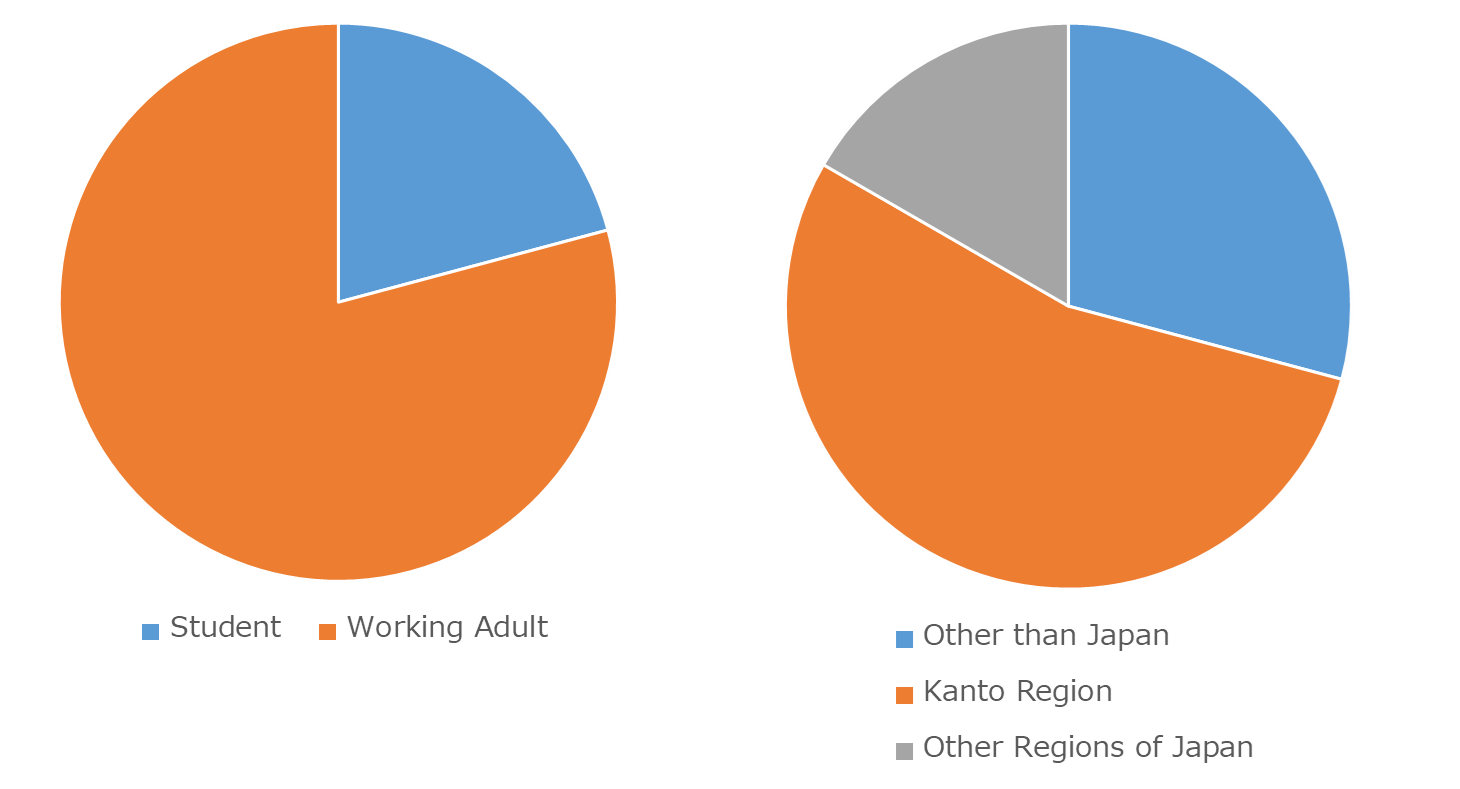
3. Planning for the Visit
This program is fully participant-led: therefore, all participants are expected to be members of below management teams: planning, research, finance, communication, and risk management.
- Planning Team: The team selected organizations to visit and coordinated visits based on members’ interests and preferences while creating a detailed schedule. Additionally, they organized and conducted debriefing sessions after the visit.
- Research Team: To deepen members’ understanding of Colombia, the team held five study sessions where participants shared and discussed the results of their research. They also compiled a report to share insights gained after the trip.
- Finance Team: The team calculated travel-related expenses and managed the financial operations necessary for the trip.
- Communication Team: The purpose of this team is to facilitate and promote communication among participants by creating opportunities for casual conversations.
- Risk Management Team: This team researched safety information about the travel area and compiled health and hygiene precautions, contributing to a safe and smooth journey.
4. Visit to Colombia
During our stay in Colombia, ColSP participants were divided into several groups and visited various governmental, international, and non-governmental organizations listed in the chart below.
| Date | Location | Organizations |
|---|---|---|
| 9/9 (Mon) | Bogotá | World Bank, UN Habitat, ARN, Rappi |
| 9/10 (Tue) | Medellín / Santa Marta | COTEPAZ, COMUNA13 / UNODC |
| 9/11 (Wed) | Medellín / Bogotá | Ajizal, WFP, Haru no Hinata (Medellin Japanese Culture Center), Eumara Indígenas / IDB, UNODC |
| 9/12 (Thr) | Medellín / Bogotá | Salón del nunca más, Coffee Farmers' Cooperative, Guatapé / UNIDO |
| 9/13 (Fri) | Bogotá | UNICEF, WFP, JICA, UNVM, UN Women, UNHCR, JETRO |
We would like to express our gratitude to individuals and organizations who contributed to the success of the Colombia Study Program 2024.
5. Post Visit Activities
After the visits to Colombia, we disseminated a report, including our findings, on the Kokuren Forum’s website and through our mailing list and social media, which collectively have over 20,000 subscribers among Japanese nationals. We have also held debriefing sessions in several locations in Japan (Tokyo, Osaka, and Hiroshima) and online to share our experiences and learning gains from the visit. We believe these efforts can contribute to promoting valuable works of organizations we visited in Colombia and raising awareness of Colombia's peace and sustainable development efforts.
Voices of Project Participants
Riho
My name is Riho Takebayashi, and I have been working as an M&A strategy advisor in Tokyo for the past two years. The ColSP is my second study program (SP), following the Jordan Study Program (JSP) in 2019, which I participated in as a university student.
I decided to apply for this program again to challenge myself and create meaningful change. Since I started working, I have often found myself witnessing global crises through TV shows without taking any real action. When I heard that the SP was resuming after a break, I saw it as an opportunity to dedicate time to deeply reflect on humanitarian crises around the world and to discover ways I could contribute.
Through this program, I have gained two key achievements: (1) leadership capacity and (2) academic insights.
(1) Leadership Capacity
What sets this study program apart is that participants are responsible for organizing everything themselves, based on their own preferences. While this is fascinating, it also demands a high level of commitment. During my participation in JSP, I struggled to keep up with the team, which left me regret.
Thanks to the culture of SP that encourages and supports anyone who tries new initiatives, I took on the role of leader in the planning and communication team this time. I made a promise to myself to ensure no one is left behind, but balancing quick decision-making with listening to everyone’s perspectives was challenging. To address this, we adopted approaches such as fostering casual conversations inside and outside of meetings to build good relationships, asking members to prepare before meetings to some extent to start on the same page, and dividing into small teams to make it easy for everyone to be included. While I still have room to grow as a leader, I was encouraged when one of the youngest members shared that he initially felt hesitant but became more actively involved over time. This experience made me hopeful that I was able to give back to a program that has given me so much.
(2) Academic insights
What left the deepest impression on me during my visit to Colombia was the remarkable strength of people who forgive someone who hurt them. Colombia has been in conflicts over 50 years which created cycles of violence and chains of hatred. Listening to their stories of suffering was overwhelming, I even felt anger and fear inside myself. Yet, I was inspired by their resilience as they keep engaging in dialogues with ex-combatants to foster understanding, forgiveness, and peace.
Although I spent much time learning about conflict history and peace agreement beforehand, it was the first time I truly realised how much contribution people in Colombia made behind that when I visited the town caught in the conflict. It also reminded the importance of visiting fields and listening directly to those involved.
Finally, I would like to express my gratitude to everyone who warmly welcomed us in Colombia, who kindly offered us advice anytime, who passionately created this amazing program together. ColSP inspired my passion for contributing to peacebuilding, and I am determined to continue this journey with dedication and purpose.
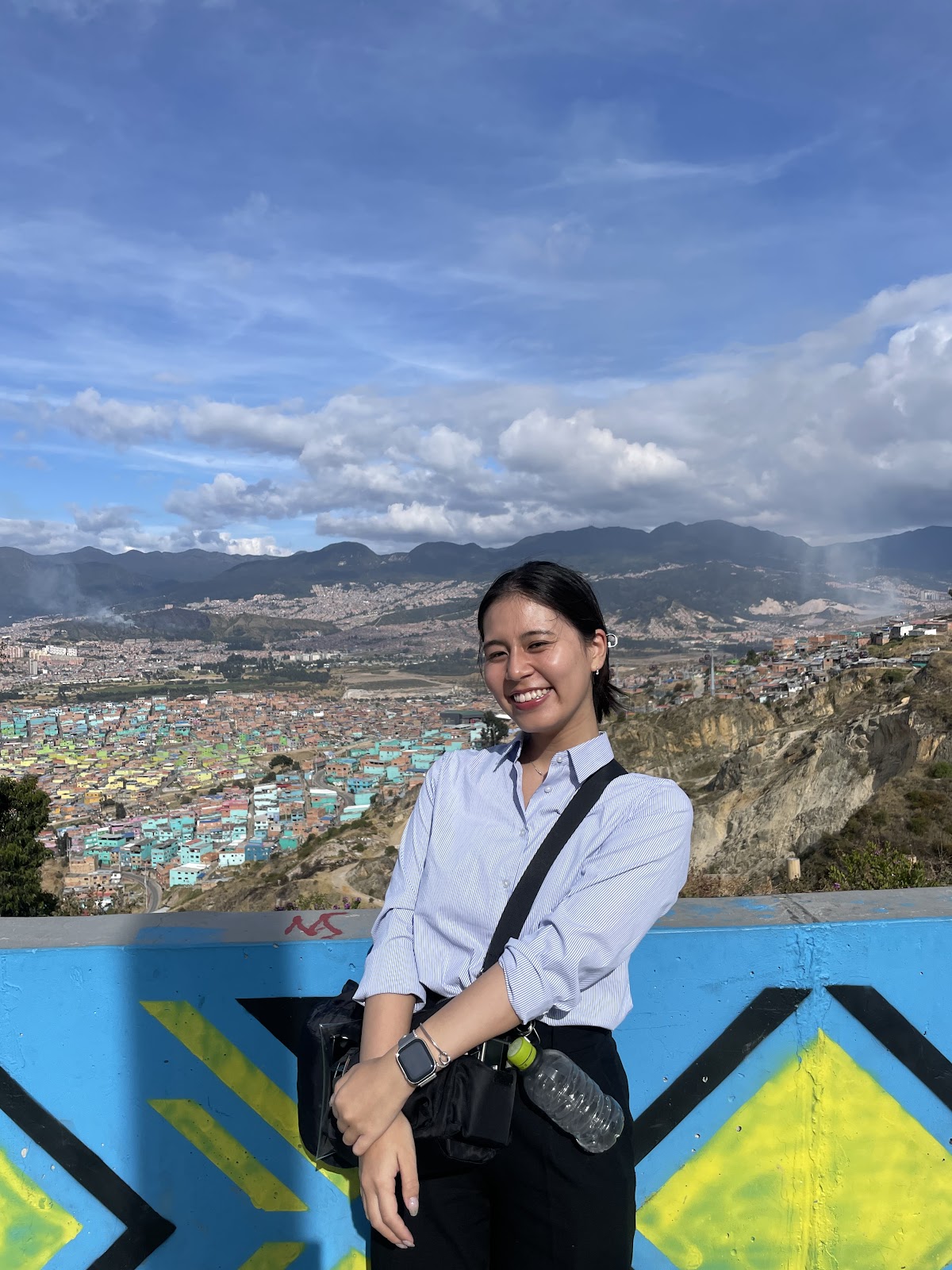
Atsuko
I am Atsuko and I work for a financial services company. When I heard about this program, it reminded me of how I was interested in the works of international organizations and NGOs from my college years. Although my work involves global communication, it is largely business oriented. This program presented a valuable opportunity to visit such organizations and sites that tackle humanitarian problems. South America, let alone Colombia was also a place I’ve never been and that was another point that drew my interest.
One of the most impressive points from my visit was how the people involved in these projects and activities are all forward looking. They are thinking constructively on how to make peace and move forward, and have positive hope on their own lives too. We had the chance to meet with former combatants from the armed forces, but they are now acknowledging what they’ve done, seeking for forgiveness and there are some places that understand and help them reintegrate into the civil society. This may be because of the concept of forgiveness that comes from the religious background, but also because the Colombians know how hard it is to live during wartime and wish for peace. We may have seen and heard better examples of how they are evolving into a more peaceful Colombia, but with only eight years from the peace agreement, I felt it was a remarkable accomplishment for Colombian society.
This may relate to my next point about the Colombian culture which I felt was very humble, respectful and calm. It was a good surprise as I was a little nervous about the country’s safety prior to the trip. We were cautious and there were some areas that we shouldn’t wander alone, but luckily no one got into any issues. The people we met treated us with great respect and hospitality, so that I sometimes wondered if I had paid enough respect and gratitude in return.
Finally, I must say that the members from the Study Program were exceptional that I have the most respect and can’t thank enough. We started meeting online, researched Colombia and most of us made it to the site. We were not just a diverse group but at the same time we all had good minds that made this program enjoyable and intelligently stimulating.
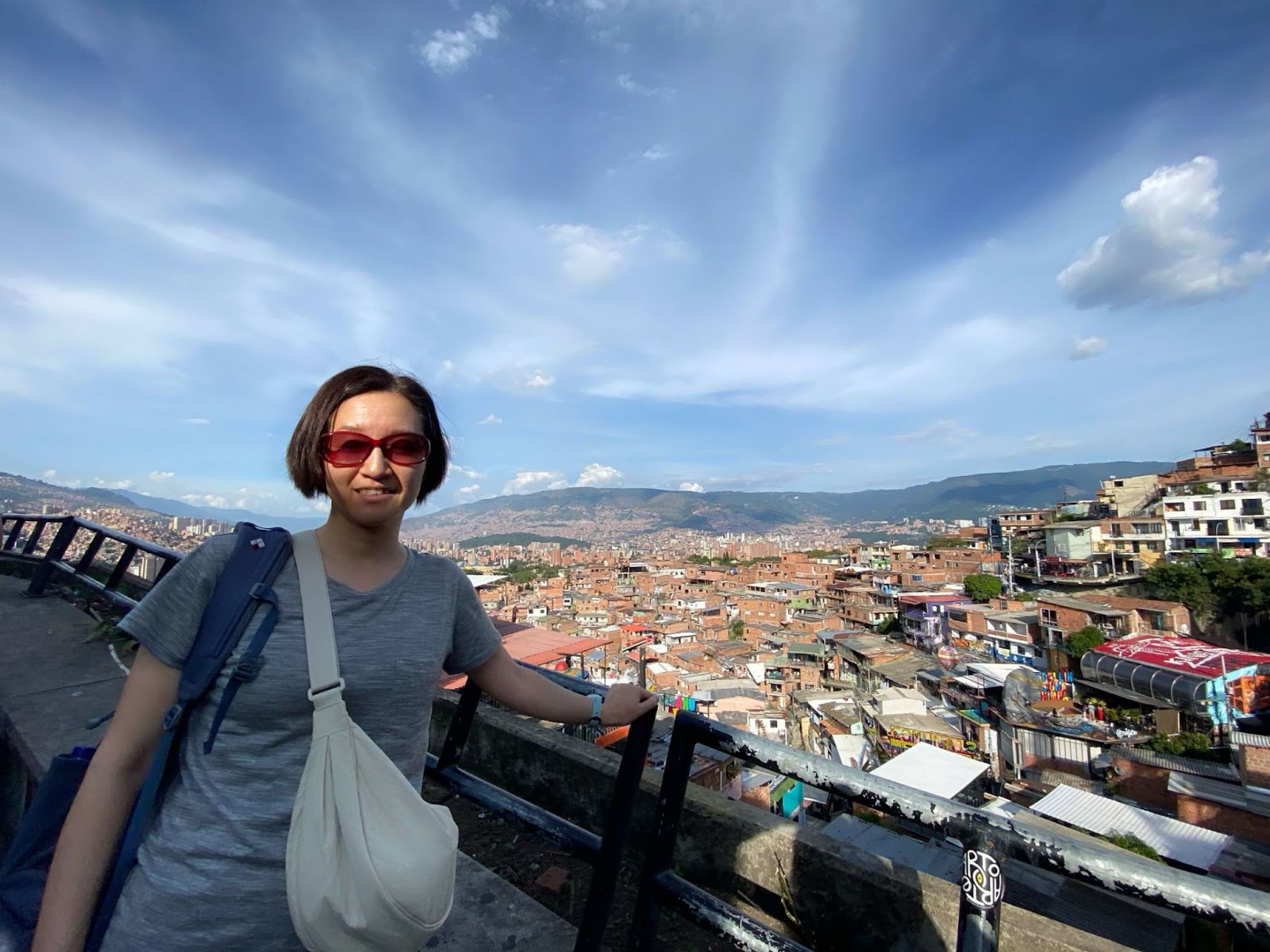
Riku
My name is Riku, and I’m a university student in Tokyo. I believe joining the Colombia Study Program gave me an insight into how entities interact towards a shared goal and allowed me to further understand how societies recover and thrive after conflict. While I had previously learned about peacebuilding in theory, witnessing Colombia’s journey firsthand gave me a deeper insight into the complexities at stake and the unwavering commitment of its people.
During our visit, an impactful experience was hearing the story of an Indigenous woman who shared her journey and cultural pride. Her perspective offered a personal insight into the struggles faced by Indigenous peoples in Colombia, especially the challenges surrounding displacement and discrimination. She shared the Indigenous population's difficulties in adapting to unfamiliar environments while striving to preserve their cultural traditions. The narrative emphasized the importance of passing down knowledge to younger generations, underscoring the need to preserve customs, language, and spiritual practices to ensure they are maintained for the years to come. Her words illustrated the strength of individuals striving to create a better future for their communities while seeking reconciliation and understanding. This made me reflect on the crucial roles of individuals and their impact in shaping broader movements to achieve peace and justice. Despite her deeply personal story, it also highlighted more pervasive challenges, including further recognition of indigenous rights in Colombia's post-conflict efforts.
In terms of the process of building the program, the experience was shaped by the dedication of all participants from various backgrounds. The whole program was a collective endeavor as each participant played critical roles, whether that is in coordinating visits, leading study sessions, or facilitating communication within our teams. Altogether, I believe the whole process was an irreplaceable experience where participants got to learn and hone their skills in leadership and cohesive teamwork.
Overall, the Colombia Study Program gave me the opportunity to think critically about global issues and learn from my peers who work in diverse professional fields. The whole experience reinforced the importance of collaboration and understanding in addressing the world's most critical issues. Finally, in the future, I plan to take this opportunity further in my academics and career, seeking a meaningful way to contribute to society.
